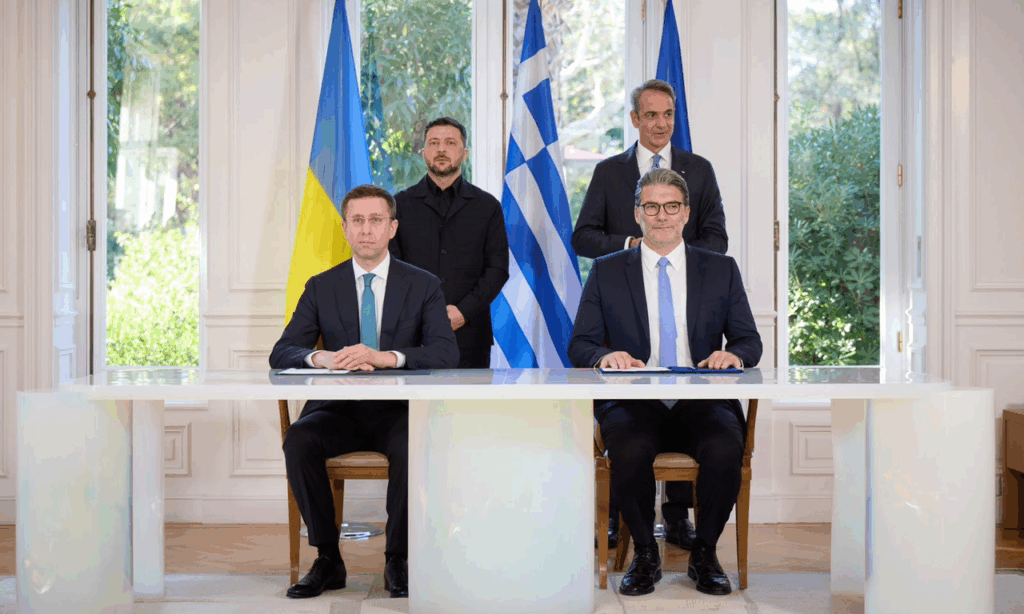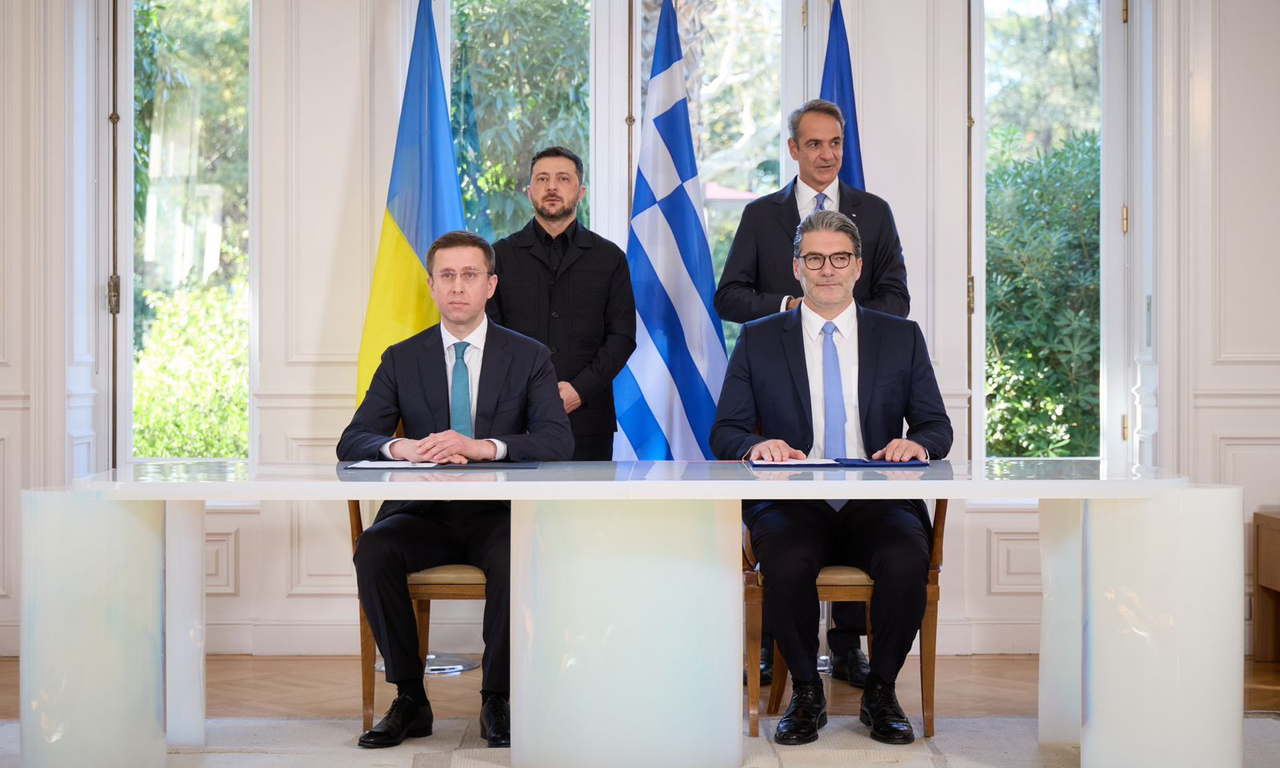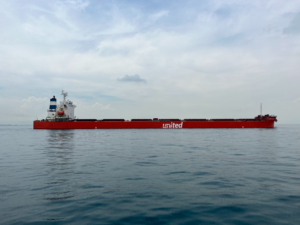
Ukraine has secured imports of U.S liquefied natural gas (LNG) from Greece to cover its winter needs from December through to March next year, Greek and Ukrainian officials said on Sunday.
Greece’s energy group DEPA Commercial and Naftogaz of Ukraine announced the deal, which will run from December 2025 until March 2026, following a meeting on November 16 between Ukrainian president Volodymyr Zelenskyy and Greek prime minister Kyriakos Mitsotakis.
In their presence, a Letter of Intent was signed on the supply of natural gas to Ukraine during the winter period.
“Our agreements with Greece today are an important part of the large energy package we have prepared for this winter to ensure gas supplies to Ukraine,” Zelenskyy said.
The document was signed by chief executive officer of Naftogaz Sergii Koretskyi and CEO of the Greek company DEPA Commercial Konstantinos Xifaras.
Gas will be transported to Ukraine via a route jointly supported by gas transmission system operators from five European countries.
Under the framework of the prospective agreement, LNG volumes originating from the United States are expected to be transported through “Route 1”, offered jointly by the gas transmission system operators (TSOs) of Greece (DESFA), Bulgaria (Bulgartransgaz), Romania (Transgaz), Moldova (VestMoldTransgaz), and Ukraine (GTSOU).
“The supply of U.S. LNG will be facilitated through ATLANTIC–SEE, in which DEPA holds a 40% stake, underlining the company’s commitment to providing practical and secure energy solutions across Southeast Europe,” Konstantinos Xifaras, chief executive officer of DEPA Commercial, emphasized.
From his side Sergii Koretskyi, chief executive officer of Naftogaz, noted: “This partnership opens another reliable direction for imports for the upcoming winter. We are consistently and systematically expanding the geography of supplies to guarantee stable heating for Ukrainians and to strengthen the energy security of the entire region.”
The agreement came as Zelenskyy visited Athens aimed at shoring up his country’s energy supply, as it enters another gruelling winter nearly four years into Russia’s invasion.
During the meeting, the parties discussed energy cooperation in detail, specifically the agreement between Ukraine and Greece on gas, which will help the country get through the winter.
The agreement “marks an essential step in strengthening regional energy cooperation and European energy security,” according to a joint statement from DEPA- Naftogaz.
Greece is poised to become a pivotal “LNG corridor” under a deepening US-Greece partnership. Washington views Greece not just as a buyer but as a strategic partner, channelling new LNG flows to Europe to gradually replace Russian gas.
In recent months, this major energy shift has been accompanied by heightened activity in Athens. High-level US officials have been meeting with the Greek government and leading Greek energy entrepreneurs, with American liquefied natural gas (LNG) at the center of discussions.
Washington’s ambition is to flood Europe and Greece with American LNG.
The Greek prime minister emphasized Greece’s role in European and regional energy security and in Ukraine’s energy security, which has been upgraded following the recent agreements signed in Athens for the supply and transport of American LNG through the Vertical Corridor, as well as the agreement signed between DEPA and Naftogaz.
“Relations between our countries are now also taking on a new critical dimension, that of the new, secure energy artery stretching from south to north, from Greece to Ukraine. This is being achieved through the vertical energy corridor currently under development and the Alexandroupolis-Odessa corridor,” the prime minister of Greece emphasized.
“This gives Ukraine direct access to diversified and reliable energy sources, while Greece becomes a hub for supplying Central and Eastern Europe with American liquefied natural gas. It is a decisive contribution to energy stability, resilience, and security, not only in our region but also in yours. Greece, to put it simply, is becoming a provider of energy security for your country.”
“Undoubtedly, these are all catalytic developments on the road to definitive independence from Russian natural gas, because Europe will stop buying Russian natural gas, which will no longer be able to enter our continent ‘in disguise’.”
During the visit to Athens, the officials discussed ways to strengthen cooperation aimed at restoring comprehensive, just, and lasting peace in Ukraine and ensuring stability and security in the Mediterranean and the Black Sea, South-East Europe and wider Euro-Atlantic region.
Zelenskyy began his working visit to Greece with a meeting with president of the country Constantine Tassoulas to discuss energy support for Ukraine and the implementation of joint projects.
The discussion included the need to ramp up sanctions against Russia to force it to come to the negotiating table, and the use of frozen Russian assets. Ukraine expects the European Union to adopt a decision this year to direct these funds to Ukraine’s defense.
The deal comes after Greece clinched its first long-term deal to supply U.S. LNG to Europe from 2030 after the EU approved a ban on Russian LNG from 2027 over Moscow’s war in Ukraine.
Atlantic-See LNG Trade S.A. – a newly formed joint venture between Greek companies AKTOR and DEPA Commercial – reached an agreement with the American producer and exporter of U.S. liquefied natural gas (LNG), Venture Global, to bolster Central and Eastern European energy security.
New York-listed Venture Global has entered into a 20-year sales and purchase agreement with Greece’s Atlantic-See LNG Trade S.A. for the purchase of a minimum of 0.5 million tonnes per annum of U.S. liquefied natural gas (LNG) from Venture Global for twenty years starting in 2030.
The announcement of this supply agreement follows Venture Global’s previously announced investment in regasification capacity at the Alexandroupolis LNG import terminal in Greece, which currently accounts for approximately 25% of the terminal’s total capacity.
The Alexandroupolis LNG FSRU receiving terminal and South-North ‘Vertical Corridor’ will be essential to enhancing Central and Eastern European energy security by providing a new route to bring U.S. natural gas into the region.



